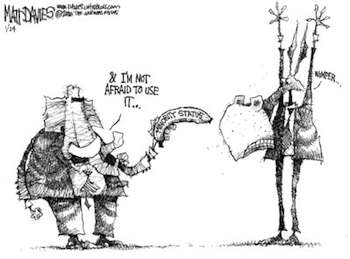- MENU
- HOME
- SEARCH
- WORLD
- MAIN
- AFRICA
- ASIA
- BALKANS
- EUROPE
- LATIN AMERICA
- MIDDLE EAST
- United Kingdom
- United States
- Argentina
- Australia
- Austria
- Benelux
- Brazil
- Canada
- China
- France
- Germany
- Greece
- Hungary
- India
- Indonesia
- Ireland
- Israel
- Italy
- Japan
- Korea
- Mexico
- New Zealand
- Pakistan
- Philippines
- Poland
- Russia
- South Africa
- Spain
- Taiwan
- Turkey
- USA
- BUSINESS
- WEALTH
- STOCKS
- TECH
- HEALTH
- LIFESTYLE
- ENTERTAINMENT
- SPORTS
- RSS
- iHaveNet.com: Politics
by Bill Press

Senate Filibuster (© Matt Davies)
Among other priorities in his State of the Union address, President Obama vowed to change the way Washington works.
Here's one good place to start: get rid of the filibuster. It's undemocratic, and it invites gross, mindless partisanship -- especially the way it's employed by today's Senate Republicans to block any legislation or nomination coming out of the
Until recent years, the filibuster was the exception, not the rule, designed to allow any senator to stop a vote on pending legislation by debating it as long as he wanted. There were only two conditions. The objecting senator had to continue speaking from the podium, without interruption, for the duration of the filibuster -- or until 67 senators rose up to stop it: a move called "cloture." And the
That led to colorful moments in history. In 1953, Oregon's longwinded Wayne Morse filibustered Tidelands Oil legislation for 22 hours and 26 minutes. But four years later, Strom Thurmond, then still a Democrat from South Carolina, set a new record, which stands to this day, arguing against the Civil Rights Act for 24 hours and 18 minutes -- until, presumably, his bladder gave out.
New rules made the filibuster easier to use, but more open to abuse. In the '60s, Sen. Robert Byrd introduced what might be called a "stealth filibuster," allowing the
And in 1975, the
But even that wasn't enough. Today Republicans demand a filibuster, or "super-majority" on every single
What we have in the
Actually, we know what would happen because we saw it before. In 2005, when Democrats in the minority attempted to filibuster certain judicial nominations of President George W. Bush, Republicans led by Majority Leader Bill Frist threatened to employ a "nuclear option." Their plan was for Vice-President Dick Cheney, as president of the
Democrats may not have to go to that extreme. Sen. Tom Harkin has recently resurrected a proposal he first introduced in 1995 to lessen abuse of the filibuster. After two days, according to his plan, the 60 votes required to invoke cloture would be reduced to 57, two days later, to 54. And so on. The problem is that changing any
So, in the end, it's Joe Biden to the rescue. Democrats have no choice but to drop the nuclear option themselves. Kill the filibuster. Health care, climate change, and Wall Street reforms are too important to leave at the mercy of a minority of obstructionist, undemocratic, crybaby Republicans.

Free Speech Ain't Cheap (© Walt Handelsman)
Available at Amazon.com:
The Political Fix: Changing the Game of American Democracy, from the Grassroots to the White House
AMERICAN POLITICS
WORLD | AFRICA | ASIA | EUROPE | LATIN AMERICA | MIDDLE EAST | UNITED STATES | ECONOMICS | EDUCATION | ENVIRONMENT | FOREIGN POLICY | POLITICS
Receive our political analysis by email by subscribing here
Bring Democracy to the Senate | Bill Press
© Tribune Media Services